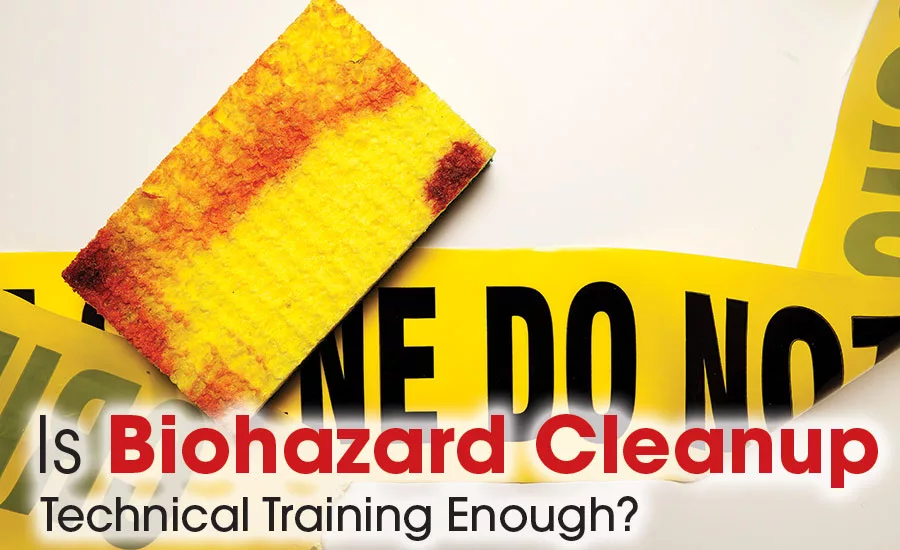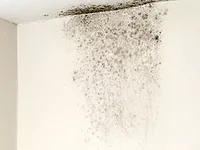Is Forensic Restoration Training Enough?
It comes down to 3 basic questions.

For those of us who have accepted the responsibility of biohazard clean-up, there inevitably comes a time when your team will be called to a grizzly trauma scene. Regardless if there was a crime committed, death from natural causes or suicide, the impact and weight of the experience can be profound.
For most of us, it’s easy to see the value in technical training as we know it ensures our company is protected from a liability perspective. We understand that it equips our team to be a better vendor for our referral partners. Additionally, we can see how a well-trained technician can provide a quality service to our client. But have we considered what standard technical training doesn’t do? Does it adequately equip our team to understand and navigate the complex emotions that our client may be experiencing? Does it ensure that our team members exposed to those experiences remain well adjusted and emotionally sound? Have we stopped to consider what other organizations, groups, or local service providers may be willing to partner with our teams to provide additional training and support for our warriors in the trenches?
Caring for the Customer
The state of a client that has just experienced loss or witnessed the aftermath of human violence can range greatly. Standard training teaches us to assess building materials, understand PPE requirements, design solid operational practices, and create great invoices, but they don’t necessarily equip us to help our client in a way that is sensitive to their emotional needs during this time. In no way am I saying our team members need to become certified crisis responders and/or counselors, but rather I am saying we can be better at partnering with other organizations and service providers to help our team learn skills that standard technical training may not cover. In our organization, we believe our clients subconsciously, sometimes even consciously, are all asking us the following three questions:
- Can I trust you?
- Do you care about me?
- Can you help me?
We believe our job is to answer yes to all three questions with the way we conduct ourselves and interact with them. Crisis response training provided by organizations like crisis chaplaincy groups and local trauma counselors can give your team basic tools they can use in the field to ensure their actions show your client they are cared for, your team is trustworthy and absolutely qualified, and willing to help them in their moment of extreme need.
Caring for Your Team
For the heroes that dedicate their lives to our police, firefighting, and emergency medical fields, the risk of burn-out, PTSD, or a similar mental/emotional impact is common, if not inevitable. Our team members who are consistently exposed to the wide range of emotional, physical and mental demands of trauma clean-ups run a very high risk of experiencing these as well.

The same agencies that can partner with your organization to equip your team to address the needs of your clients are also the same professionals that can be partnered with to help your team deal with the rigors of this industry in a way that is both healthy and sustainable. For example, we highly believe in the mission of our local crisis chaplains as they provide counseling and crisis response to our local EMS providers. As part of our commitment, we provide monthly financial support to the crisis chaplains and in return, they are willing to meet with our staff one-on-one when the need arises. They also provide group training so we are equipped to look for signs of concern and establish healthy ways to make adjustments as needed. Our work force is diverse and the beliefs or religious practices of our team members are equally as diverse but the chaplains provide certified, well-trained, and experienced counseling and support to our employees regardless of religious preferences.
Our employees are serving clients during some of worst experiences in their lives, even in non-trauma related events such as fire and water damage there is still a sense of loss, stress and at times even extreme levels of anxiety. This requires that our technicians are not just well equipped for the technical aspects of their jobs but also sensitive and aware of our client’s emotional needs as well. Our team members are heroes. Every day we ask them to wade through the sweat, blood, soot, and sewage to help restore the lives, homes, and businesses of our clients. Let’s ensure we have built the best network we can in order to make sure they receive all the support they need when they get back to base.
Looking for a reprint of this article?
From high-res PDFs to custom plaques, order your copy today!






